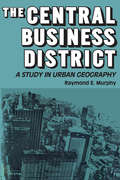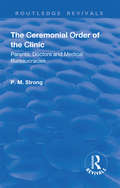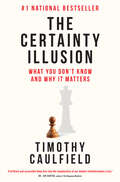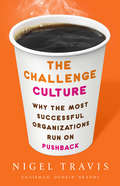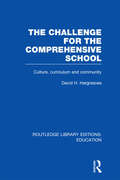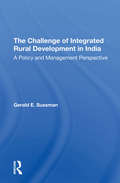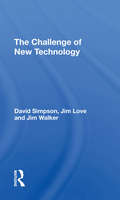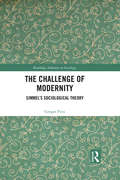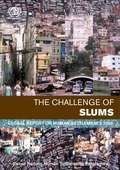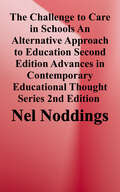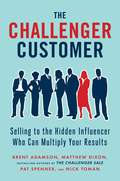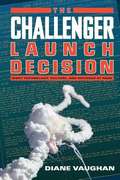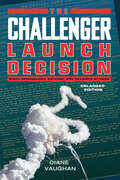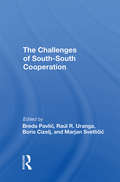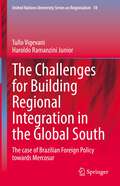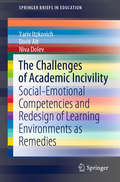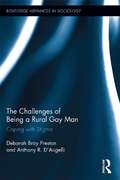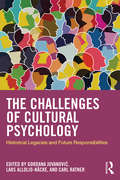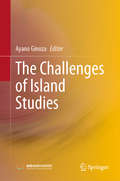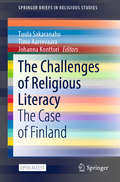- Table View
- List View
The Central Business District: A Study in Urban Geography
by Raymond E. MurphyThe rapidly changing structure of urban social and economic activity in recent years has given rise to a great deal of concern regarding the fate of that area of the city where economic activity is chiefly concentrated: the central business district (CBD). This book, a geographic study of the changing nature of CBDs, represents a concise, well-ordered, and readable attempt to deal with that concern. Written by a widely known authority on the subject, it provides a comprehensive summary and analysis of much of the research done on CBDs over the past two decades and establishes many striking generalizations regarding the past, present and future evolutions of CBDs, both in this country and abroad.Using maps and diagrams where helpful, Murphy, a pioneer researcher in this field from the standpoint of economic geography, provides the record of his own and others' attempts to define CBDs and to develop theories about them. He not only presents the story of the research attack on the CBDs of a number of cities, including estimates of their probable future, but also details a practicable technique for delimiting and studying CBDs.An important feature of the book is the attention Murphy devotes to the valuable work done in this field outside America, and his examples, which fully cover the American experience, are by no means confined to it, taking in important urban centres throughout the world. This book, intended for anyone interested in the urban scene, will be particularly helpful to students and teachers of urban geography and to practicing urban planners.
The Ceremonial Order of the Clinic: Parents, Doctors and Medical Bureaucracies (Routledge Revivals)
by Robert Dingwall P.M. StrongThis title was first published in 2001. A classic ethnographic study of the interactions between paediatricians and parents of children thought to be neurologically handicapped. Strong used this work to systematize the often chaotic ideas of Erving Goffman, to explore the connections between micro and macro analysis in sociology and to reflect on the nature of medical practice in modern liberal societies. The book stands as a testament to Strong’s pursuit of methodological rigour in qualitative sociology.
The Certainty Illusion: What You Don't Know and Why It Matters
by Timothy CaulfieldIn a world where there is so much conflicting information about how we are supposed to live, what can we really know?Knowing the truth, what&’s real from what&’s fake, should be easy. In today&’s world, that&’s far from the case. In The Certainty Illusion, Timothy Caulfield lifts the curtain on the forces contributing to our information chaos and unpacks why it&’s so difficult—sometimes even for experts—to escape the fake.Whether it&’s science, our own desire to be good and do the right thing, or the stories and opinions of others, there&’s more to sussing out the truth than simply tracking down what feels like an authoritative source. Caulfield argues that these major forces—science, goodness, and opinion—drive beliefs and behaviour, but the ways that they can be corrupted, or worse, used to nefarious ends by bad actors, are endless.While it may feel, at times, as though we are circling the drain of truth, especially as new technologies make it even easier to spread dangerous fictions, Caulfield pulls us out of the vortex and keeps us afloat, helping us recognize and combat the forces that threaten to pull us under.
The Chalice and the Blade: Our History, Our Future
by Riane EislerThe author presents her view of the human condition based on an analysis of prehistory and history which exposes a global shift to patriarchy.
The Challenge Culture: Why the Most Successful Organizations Run on Pushback
by Nigel TravisThe executive chairman and former CEO of Dunkin' Donuts and Baskin Robbins reflects on the unique, results-oriented discipline he's developed over decades of leadership, which provides a blueprint for any organization to achieve prosperity.We live in an era in which successful organizations can fail in a flash. But they can cope with change and thrive by creating a culture that supports positive pushback: questioning everything without disrespecting anyone.Nigel Travis has forty years of experience as a leader in large and successful organizations, as well as those facing existential crisis-such as Blockbuster as it dawdled in the face of the Netflix challenge. In his ten years as CEO and chairman of Dunkin' Brands, Travis fine-tuned his ideas about the challenge culture and perfected the practices required to build it. He argues that the best way for organizations to succeed in today's environment is to embrace challenge and encourage pushback. Everyone-from the new recruit to the senior leader-must be given the freedom to speak up and question the status quo, must learn how to talk in a civil way about difficult issues, and should be encouraged to debate strategies and tactics-although always in the spirit of shared purpose. How else will new ideas emerge? How else can organizations steadily improve?Through colorful storytelling, with many examples from his own career-including his leadership in turning around the fear-ridden culture of the London-based Leyton Orient Football Club, of which he is part owner-Travis shows how to establish a culture that welcomes challenge, achieves exceptional results, and ensures a prosperous future.
The Challenge For the Comprehensive School: Culture, Curriculum and Community (Routledge Library Editions: Education)
by David HargreavesBy 1982 the ambitious claims made for newly established comprehensive schools were being put to the test. How effectively does the comprehensive meet the needs of all young people? Do urban, working-class students enjoy more success than in the secondary modern schools? Are they more engaged in their learning with higher self-esteem? This volume discusses these questions and examines issues of social mobility and cohesion, curriculum, the balance between academic and vocational education, the place of exams in the educational system and the influence of independent schools. The author asks whether a more decentralised system of self-governing schools improve the education service – a timely question which along with the other issues examined is as relevant and challenging today as when the book was originally published in 1982.
The Challenge Of Integrated Rural Development In India: A Policy And Management Perspective
by Gerald E SussmanIn 1952, India launched a massive and enthusiastic effort to reach the 360 million people in its 550,000 villages with a national program of economic and social reconstruction. Known as Community Development, the program provided an innovative model of rural development for both Third World nations and the aid-giving countries of the West. Although the program achieved its goal of providing service coverage to the nation, its many implementation problems and the lack of quantifiable cost-effectiveness led critics to label it a failure and resulted in its submergence into the Ministry of Food and Agriculture in 1966. More recently, however, partly as a result of the social dislocations following the "Green Revolution," there has been renewed interest in Community Development as the Indian government searches for ways of effectively implementing a strategy of integrated rural development. It is recognized that a repeat of the CD program is not the answer; but an analysis of the program allows the identification of the elements critical to good administration—and political survival. Drawing on extensive interviews with Indian and American participants, this book critically appraises the Community Development program. Dr. Sussman examines the successful pilot project at Etawah, then documents the many problems—organizational, political, and logistical—that were encountered in the attempt to replicate it on a nationwide scale, and that eventually led to its demise. From his analysis emerges the question of what kind of government strategies can best equip rural populations to participate in development. Admitting the difficulties still to be faced, he concludes on a note of guarded optimism based on recent efforts in both India and the U.S. that combine a systems approach with the use of a range of development strategies.
The Challenge Of New Technology
by Jim Walker David Simpson Jim LoveThis book looks at what has actually happened when new technology has been deployed in an industrial and commercial environment. It considers the economic impact of new technology on three groups of organisations: firms, governments and trade unions.
The Challenge for Energy Justice: Correcting Human Rights Abuses
by Raphael J HeffronWritten by one of the world’s leading scholars in the field, this book provides a unique perspective on the connections between energy justice and human rights. Taking an interdisciplinary approach, the author offers an accessible discussion about the implementation of energy justice in practice. The book explores the rise of justice issues in the energy sector, the interdisciplinary nature of energy justice, the economics of energy justice and provides a practical case study on distributive justice. The penultimate chapter focuses on human rights and energy justice in a world first, and explores the topic from the perspective of the opportunity of last resort. This ‘opportunity of last resort’ is the national courts and is the place where societies can seek to have justice enforced through a variety of human rights being protected. Finally, energy justice risks are highlighted alongside the author’s proposed framework for the next generation of energy justice scholars.
The Challenge of Migration in a Janus-Faced Europe
by Laura ZanfriniThis book critically investigates the origins and consequences of the Janus-faced character of attitudes and policies towards migrants that seek to penetrate “Fortress Europe”. Beginning with an examination of its founding ambitions, it locates the roots of an ingrained ambivalence in the legacies of the post-war period and the unresolved tension between the economicism of the European approach to labour migration and the philosophy of rights and solidarity embedded in the EU project. It highlights how the formalization of citizenship rights has produced both formal pathways towards inclusion for migrants and, in their selective eligibility criteria, exclusive systems of civic stratification. The author links this oscillation between positions of closure and openness to the paradoxical trade-offs in migration policies, in particular labour market integration, demonstrated through unequal labour market outcomes, lower social mobility and educational attainments. The issues faced by migrants’ offspring in Europe are examined as paradigmatic of the struggle to balance competing calls for both pluralism and uniformity: to create a diverse society that can also project a homogenous collective identity. This balanced overview will provide an invaluable resource for students of migration studies, European politics, public policy, international relations and the sociology of racism.
The Challenge of Modernity: Simmel’s Sociological Theory (Routledge Advances in Sociology)
by Gregor FitziThe complete collected works of Georg Simmel are now available. Yet, the standing of Simmel’s sociological theory is still a subject of controversy. Is Simmel only a brilliant impressionist, a flâneur in the territories of modernity? Providing an illuminating and coherent presentation of Simmel’s sociological theory, The Challenge of Modernity seeks to demonstrate how Simmel contributed a structured sociological theory that fits the criteria of a ‘sociological grand theory’. Indeed, starting by the theory of modernity and its dimensions of social differentiation, monetarisation, culture reification and urbanisation; it reconstructs the architecture of Simmel’s sociological epistemology. Particular attention is dedicated to the theory of ‘qualitative societal differentiation’ that Simmel develops within his cultural sociology, with the late work being presented as a double contribution to the foundation of sociological anthropology and to the social ethics of complex societies. Presenting the entirety of Simmel’s manifold oeuvre from the viewpoint of its relevance for sociology, this comprehensive volume will appeal to scholars and advanced students who wish to understand Simmel’s relevance for socio-political thought and become acquainted with his contribution to sociological theory. It will also be of interest to the wider public who seek a critical assessment of our age in theoretical terms.
The Challenge of Slums: Global Report on Human Settlements
by United Nations Human Settlements ProgrammeThe Challenge of Slums presents the first global assessment of slums, emphasizing their problems and prospects.
The Challenge to Care in Schools: An Alternative Approach to Education
by Nel NoddingsIn this second edition of her educational text, Noddings suggests that if we make the responsiveness characteristic of caring more basic than accountability, we can accommodate both traditional and progressive preferences in one school system to the benefit of all... especially the children.
The Challenge to Change: Reforming Health Care on the Front Line in the United States and the United Kingdom
by Rebecca Kolins GivanThere is constant pressure on hospitals to improve health care delivery and increase cost effectiveness. New initiatives are the order of the day in the dramatically different health care systems of the United States and Great Britain. Often, as we know all too well, these efforts are not successful. In The Challenge to Change, Rebecca Kolins Givan analyzes the successes and failures of efforts to improve hospitals and explains what factors make it likely that the implementation of reforms will be rewarded by positive transformation in a particular institution's day-to-day operation. Givan's in-depth qualitative case studies of both top-down initiatives and changes first suggested by staff on the front lines of care point clearly to the importance of all hospital workers in effecting change and even influencing national policy.Givan illuminates the critical role of workers, managers, and unions in enabling or constraining changes in policies and procedures and ensuring their implementation. Givan spotlights an Anglo-American model of hospital care and work organization, even while these countries retain their differences in access and payment. Entrenched professional roles, hierarchical workplace organization, and the sometimes-detached view of policymakers all shape the prospects for change in hospitals. Givan provides important examples of how the dedication and imagination of the people who work in hospitals can make all the difference when it comes to providing quality health care even in a challenging economic environment.
The Challenger Customer: Selling to the Hidden Influencer Who Can Multiply Your Results
by Matthew Dixon Nick Toman Brent Adamson Pat SpennerAs the bestseller The Challenger Sale proved, challenging the customer is now the key to sales success. But it turns out that's only half the story. It's not just that you challenge but who you challenge that really matters. <P><P>To win today, you need a Challenger inside the customer organization--a mobilizer.Picture your ideal customer: collegial, eager to meet with you, and ready to champion your products across the organization. It turns out that's the last person you should be pitching. The need to understand how customers make their decisions, especially when it comes to selling large-scale, business-to-business solutions, drove the author team behind The Challenger Sale to investigate how sales reps won high-quality deals. What that team discovered may turn the common wisdom about customer behavior upside down. Based on an exhaustive study of hundreds of sales reps and thousands of customers across multiple industries, the authors found that every potential customer contact falls into one of seven distinct profiles. While many are worth talking to, the highest performing reps concentrated their time on a specific few. Most sales reps prefer to approach customers who are open and eager to meet with them, people with clearly articulated needs that make them easy to connect to solutions. The authors call these customers Talkers. The high performers spent their time, instead, with customers who were less eager to meet, generally skeptical and difficult to manage, and much more apt to be agnostic about one supplier over another. They call these customers Mobilizers. High performers understand what their average-performing colleagues don't: in a world in which complex deals require widespread consensus across a diverse--and typically dysfunctional--set of customer stakeholders, only Mobilizers have the skill and the will to fight for large-scale, disruptive change and, ultimately, help win the deal. Challenger sellers, in other words, target Challenger customers.The authors unveil research that identifies Mobilizers and provide a roadmap for how sales and marketing teams can find them, engage them with disruptive insight, and leverage them to drive consensus across the customer organization.Once you have identified the Mobilizers among your customers, almost any rep, with the right coaching, tools, and marketing support can start a chain reaction that leads to a whole organization getting on board with even the most provocative ideas.
The Challenger Launch Decision: Risky Technology, Culture, and Deviance at NASA
by Diane VaughanWhen the Space Shuttle Challenger exploded on January 28, 1986, millions of Americans became bound together in a single, historic moment. Many still vividly remember exactly where they were and what they were doing when they heard about the tragedy. In The Challenger Launch Decision, Diane Vaughan recreates the steps leading up to that fateful decision, contradicting conventional interpretations to prove that what occurred at NASA was not skulduggery or misconduct but a disastrous mistake. Journalists and investigators have historically cited production problems and managerial wrong-doing as the reasons behind the disaster. The Presidential Commission uncovered a flawed decision-making process at the space agency as well, citing a well-documented history of problems with the O-ring and a dramatic last-minute protest by engineers over the Solid Rocket Boosters as evidence of managerial neglect. Why did NASA managers, who not only had all the information prior to the launch but also were warned against it, decide to proceed? In retelling how the decision unfolded through the eyes of the managers and the engineers, Vaughan uncovers an incremental descent into poor judgment, supported by a culture of high-risk technology. She reveals how and why NASA insiders, when repeatedly faced with evidence that something was wrong, normalized the deviance so that it became acceptable to them. No safety rules were broken. No single individual was at fault. Instead, the cause of the disaster is a story not of evil but of the banality of organizational life. This powerful work explains why the Challenger tragedy must be reexamined and offers an unexpected warning about the hidden hazards of living in this technological age.
The Challenger Launch Decision: Risky Technology, Culture, and Deviance at NASA, Enlarged Edition
by Diane VaughanWhen the Space Shuttle Challenger exploded on January 28, 1986, millions of Americans became bound together in a single, historic moment. Many still vividly remember exactly where they were and what they were doing when they heard about the tragedy. Diane Vaughan recreates the steps leading up to that fateful decision, contradicting conventional interpretations to prove that what occurred at NASA was not skullduggery or misconduct but a disastrous mistake. Why did NASA managers, who not only had all the information prior to the launch but also were warned against it, decide to proceed? In retelling how the decision unfolded through the eyes of the managers and the engineers, Vaughan uncovers an incremental descent into poor judgment, supported by a culture of high-risk technology. She reveals how and why NASA insiders, when repeatedly faced with evidence that something was wrong, normalized the deviance so that it became acceptable to them. In a new preface, Vaughan reveals the ramifications for this book and for her when a similar decision-making process brought down NASA's Space Shuttle Columbia in 2003.
The Challenges Of South-south Cooperation
by Marjan Svetlicic Breda Pavlic Raul R Uranga Boris CizeljThe process of economi c coopera t i on among devel oping countrie s ha s come a l ong way s i nce the ea rl y 1960s . A l ong s i de the movement f rom the e s tab l i s hment of reg i onal and subreg i on a l i n tegration and cooperati on g rou p i ngs to the e l aborati on of concepts and a pproaches for g l obal and i nterreg i onal coopera t i on ( such a s , for exampl e , the scheme for a gl oba l sys tem of trade preferences a mong deve l o p ing countries ) , there has b een a n exten s ion of the scope of coopera t i on , ori g ina l l y focused on trade , to other a rea s , i ncl u d ing moneta ry a n d f i nan c i a l ma tters , produ c t ion , ma rketing , and s o on . Today , the proce s s of economic cooperation among deve l o p ing countri es occu p i e s an i mportan t pl ace i n the economi c s t rategies a n d pol ic ies of devel o p i n g countrie s and , in recent years , wit h the marked deteri o ration in the wo rl d economi c s i tu a t io n and the wea ken i ng of i n ternat i onal cooperati on for deve l opmen t , it has acqu ired even grea ter importa nce and u rgency . I n deed , i n v iew of the pro s pects for the worl d economy for th e comi n g yea rs , i t h a s b ecome an i mpera t i ve i f the devel oping cou n t ries a re going to b e abl e to env i sage the transformation of their economies and the g rowth ra tes th ey need .
The Challenges for Building Regional Integration in the Global South: The case of Brazilian Foreign Policy towards Mercosur (United Nations University Series on Regionalism #18)
by Tullo Vigevani Haroldo Ramanzini JuniorThis book analyzes regional integration in South America with a focus on the Mercosur and Brazilian foreign policy from the 1990s. It reviews the history of the Mercosur and identifies the results achieved by the bloc, as well as the causes of difficulties and the reasons for stalemates over nearly 30 years of its existence. The authors identify the complex interrelation between domestic and foreign factors that have shaped Brazilian foreign policy. From 1991 onwards, relations between Latin American countries have changed while the Mercosur developed from a free trade area to a customs union. While intrabloc trade grew, there were huge difficulties in the form of regional institutional affirmation and cooperation. This history is of the utmost importance to understanding regionalism and politics in Latin America. The book therefore has two interrelated analytical dimensions: namely, focus on ideas and identity; and behavior, actions, and economic and political interests. This very topical book is of interest for researchers and students of Brazilian foreign policy and those of Latin American and/or Mercosur countries. Particularly, readers interested in regionalism will find important theoretical and empirical elements in this book, as well as discussions necessary for comprehending the role of big, emerging countries, and the potential and limits to their international role.
The Challenges of Academic Incivility: Social-Emotional Competencies and Redesign of Learning Environments as Remedies (SpringerBriefs in Education)
by Yariv Itzkovich Dorit Alt Niva DolevThe book introduces readers with theory and empirical findings related to uncivil behaviour in academic settings and discusses its precursors, implications and remedies. In the first part, we define academic incivility, its manifestations and dimensions, while distinguishing between academic incivility and workplace incivility. We then discuss the prevalence of faculty incivility (FI) and students’ incivility (SI) in academic settings and focus on the dyadic relationships between faculty and students in the broader context of incivility in academia, with an added focus on faculty incivility.The second part introduces the main contributors to academic incivility. Personal factors, in this case, social-emotional competencies, and contextual factors, in this case, learning environments, are explored by combining up-to-date research data, personal stories and interviews with lecturers and students. A deep understanding of the precursors of academic incivility is critical to the examination of possible coping strategies within academic settings and elsewhere.In the third part, we explore the potential and practical remedies that can mitigate incivility in academic settings and, in particular, the enhancement of emotional and social competencies and the modification of learning environments.
The Challenges of Being a Rural Gay Man: Coping with Stigma (Routledge Advances in Sociology #89)
by Deborah Bray Preston Anthony R. D'AugelliGay men often face struggles in the conservative world of rural life, due to the pervasive social stigmas associated with homosexuality and the lack of anonymity in a small-town setting. In this book, Preston and D’Augelli present the results of in-depth interviews and surveys with rural gay men, providing unique and hitherto unknown perspectives on their experiences coping with intolerance. With sensitivity and humor, the authors narrate their attempts at accessing this hidden population in bars, campgrounds, social clubs, and political groups. This volume is a must-read for researchers, academics, and graduate and post-graduate students in health care, nursing, health policy, and social and psychological science.
The Challenges of Cultural Psychology: Historical Legacies and Future Responsibilities
by Carl Ratner Gordana Jovanović Lars Allolio-NäckeThis book considers cultural psychology from historical, theoretical, and epistemological perspectives, building an understanding of cultural psychology as a human science and moving beyond the nature-culture dichotomy. The unique collection of chapters seeks to advance the field of cultural psychology by reviving its historical legacies and arguing for its social responsibility in future historical developments. <P><P>It considers European legacies for cultural psychology as developed by leading figures such as Giambattista Vico, Wilhelm Wundt, Wilhelm Dilthey, and Ernst Cassirer in order to provide insights into a long tradition of thinking from a cultural psychology perspective. The book discusses historical pathways in the rise and repression of cultural psychology and its different historical forms, arguing for the necessity of decolonizing psychology, securing a place for culture in it, and developing an epistemology suited to humankind’s meaning-making processes in mutual shaping of psyche and culture. It provides an integrative and historical understanding of the subject and uses the diversity and heterogeneity within the field to offer critical reflections on its achievements. The thoroughly international group of contributors brings diverse analyses of self, body, emotions, culture, and society and considers the future of cultural psychology. <P><P>The volume is a stimulating read for scholars and students of cultural and theoretical psychology and related areas including philosophy, anthropology, and history.
The Challenges of Island Studies
by Ayano GinozaThis book places islanders’ struggles and knowledge at the forefront of island studies. Written by experts from diverse fields and locations, it covers a wide range of topics, from the history of island studies to critical ocean studies. In remapping the field of island studies from Okinawa, an emerging hub of community-based knowledge and interdisciplinary collaboration between leading critics and theorists in geography, linguistics, tourism, literature, international relations, and peace studies reveals the challenges for the future of island studies. The book consists of two parts: the first offers a collection of individual contributions that demonstrate the vital role that the field’s interdisciplinarity can play in creating bridges between the political and social issues islanders and the islands face and the disciplines involved. The second part provides a cross-disciplinary discussion between the authors and scholars of island studies in Okinawa, including local experts, and suggests new ways to think about the future of island studies that are intricately linked to islanders’ agency, preservation of languages and heritage, and the security of the islands. As such, the book directly addresses the current state of the field as well as with its future.
The Challenges of Long Term Ecological Research: A Historical Analysis (Archimedes #59)
by Robert B. Waide Sharon E. KingslandThis volume explores the challenges of sustaining long-term ecological research through a historical analysis of the Long Term Ecological Research Program created by the U.S. National Science Foundation in 1980. The book examines reasons for the creation of the Program, an overview of its 40-year history, and in-depth historical analysis of selected sites. Themes explored include the broader impact of this program on society, including its relevance to environmental policy and understanding global climate change, the challenge of extending ecosystem ecology into urban environments, and links to creative arts and humanities projects. A major theme is the evolution of a new type of network science, involving comparative studies, innovation in information management, creation of socio-ecological frameworks, development of governance structures, and formation of an International Long Term Ecological Research Network with worldwide reach. The book’s themes will interest historians, philosophers and social scientists interested in ecological and environmental sciences, as well as researchers across many disciplines who are involved in long-term ecological research.
The Challenges of Religious Literacy: The Case of Finland (SpringerBriefs in Religious Studies)
by Timo Aarrevaara Tuula Sakaranaho Johanna KonttoriThis open access book presents religious literacy as the main explanatory factor when dealing with certain ethnic groups that attract stereotypes which gloss over other personal factors such as age, class, gender and cultural differences. It discusses freedom of religion, and the Christian revival movement. It examines religious literacy and religious diversity in multi-faith schools. It looks into the role of Mosques and Islamic divorce. Finally, it discusses the prevention of violent radicalization and extremism in Finland. Using recent data on Finnish secular society, the book promotes a new understanding which is needed with respect to popular and media portrayal of religion, or with respect to public discussion about religion. It addresses actors in civic society, public servants and higher education.
